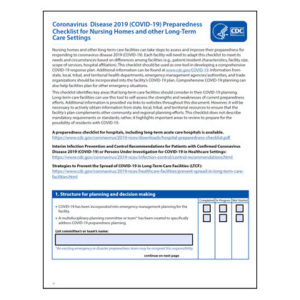Supporting families through the nursing home transition
Long-term care placement is probably one of the most difficult, heart-wrenching, but necessary decisions of a family’s lifetime. The difficulty often originates from decisions made by family members for a loved one who may be denying or intellectually unable to accept that a necessity exists. The persistent stigma of nursing homes, coupled with a family’s deep, emotional ties to a parent, evokes a potential array of painful emotions, ranging from guilt and sadness to anger and despair.
Some family members may realize at least temporary comfort after careful, lengthy discussions with friends, relatives, and/or healthcare personnel sharing similar experiences or recommending a long-term care facility. Touring a prospective nursing facility reputed to provide quality care and gathering information from key staff members may further ease the tension and anxiety. But the difficulties of transitioning from the community and positively acclimating to the long-term care facility can persist, for a variety of reasons.
The critical component for successfully guiding families through this trying and tedious process is a professionally and personally competent nursing home staff. Here is what is required of staff each step of the way.
Transitioning
The admissions director will, starting with the original hospital-referred interview and facility tour through the admission itself, enlighten family members and/or the “responsible party” regarding the process. Addressing financial requirements and guidelines early on, and emphasizing that the resident or her representative does not have to relinquish the right to handle her own affairs, will be appreciated. Alleviating such worries affords family members the time and energy to focus more intently on addressing those nursing, dietary, and recreational needs that most crucially affect the resident’s quality of life.
Family members require reassurance that their wishes will be honored and their overall needs will be met. Introducing the family to a compatibly selected roommate, for example, will provide solace that their loved one will have appropriate companionship. Encouraging the transfer of personal items, such as a favorite chair, to the facility reinforces that the concept of “home” is strongly promoted, not obliterated.
Introductions to the administrator, director of nursing services, and other appropriate staff able to address major areas of concern in detail is critical. It would also behoove the administrator to personally seek out new family members on the nursing units to assure them that he or she is available at any time for support, impressing upon them that even the chief executive is fully committed to their loved one’s well-being.
As family members come to rely on key department managers and supervisors subsequent to admission, this will enhance their sense of structure and afford them the ability to establish a positive emotional foothold in the facility.
Short-Term Approaches
The first week’s stay, particularly, is when facility staff must proactively address residents’ and families’ needs so that they may begin to grow accustomed to the new environment. Accordingly, department managers must diligently seek out family members who can disseminate important background information about the resident requiring priority attention. The food service manager must determine food preferences; the recreation director must ascertain favorite pastimes and activities; and facility staff in general must, of course, collaborate to produce an acceptable, all-encompassing medical care plan tailored to the resident. Family members will require much support throughout this process while nervously anticipating positive signs of resident acclimation.
The appropriate department manager or supervisor must be available and observed as sincerely engaged in resolving specific issues. Also, inviting a family member to share a favorite meal or preferred activity with his or her loved one is a tangible way to project stability and generate positive feedback. Concerted, ongoing efforts by staff through the first 30 days will allow the resident and family to adapt to a consistently successful daily routine.
Long-Term Approaches
Most family members, regardless of the quality of care provided, will require varying degrees of ongoing staff support. The vast majority will remain buoyed by continuing to attend and participate in quarterly care planning and other occasional family meetings, while receiving periodic sincere support from staff they have grown to trust and respect.
A handful of family members will require more intense staff support if they are tormented by, for example, inordinate, persistent feelings of guilt, sadness, anger, or despair. Juxtaposing this with their own family responsibilities, medical and/or personal issues will further heighten their anxiety and exacerbate negative, underlying feelings. In any case, the social service department must play an integral role in assisting family members to deal with such emotions.
By the time the admission is completed, a social service department representative will have already met with the family and documented a social history and other relevant information, thereby establishing mutually helpful, preliminary familiarity and rapport. Subsequent periodic counsel-ing may be necessary. Some family members may benefit from access to a wider range of intervening options, enabling them to ex-plore sometimes complex family dynamics with the social service team to potentially resolve a variety of problems.
If the resident continues unnecessarily to be the primary catalyst for the family’s distress, a family/resident meeting chaired by the social service director or administrator, depending on the severity of the problem, would be appropriate. Hearing firsthand a positive, more realistic side to the resident’s expressed negativity regarding the food service, for example, may clarify the family’s perspective. Further discussion may lead to uncovering the true reasons for the resident’s complaints.
A particular family member, usually a daughter or daughter-in-law, might be overly involved in the situation. Assuming too much responsibility can create unwanted and unneeded stress and, ironically, may breed resentment toward the resident. Involving a maximum number of immediate family members is necessary for the staff to tactfully, but firmly, impress upon the group that a collaborative effort is most helpful to everyone, especially the resident. This can also significantly lessen feelings of guilt, doubt, and insecurity on the part of the especially involved family member as to whether she is doing “her share.”
Some family members may be unable to “compensate” for their emotions in any interactive fashion because their loved one is uncommunicative and severely medically debilitated. Their optimal outlet and source of consolation may be to participate in support groups with long-standing facility family members, who might be able to place a positive, more personal perspective on the nursing home experience.
Encouraging intermittent intervention by the facility medical director and/or other consultants offers relatively unconventional, but appropriate, avenues to consider in satisfying family needs. The family should always be encouraged to use their presumably unlimited access to the resident’s primary care physician to gain reassurance and information.
The administrator might from time to time invite certain family members to lunch in order to gauge their needs and issues. Attempts at immersing family members in the social milieu by inviting them to holiday gatherings or encouraging them to volunteer to accompany residents on a community outing will help further attach them to the facility and its staff.
Rarely it occurs that family members are wholly inconsolable despite intense individual or group counseling. They may feel they can never do enough, whether the resident agrees or not, and spend enormous amounts of time at the resident’s bedside, often to the practical exclusion of all else. For those who sincerely feel unable to come to terms with this unpleasant end-of-life phase for a parent or other loved one, ongoing individual and team support will maximize any positive feelings they have that staff is at least working with them toward providing quality care. Personal empathy and daily encouragement from a CNA or recreation assistant closely involved with that resident’s care should remain the norm in any event.
Rarer still are those volatile individuals who express anger and disdain despite all the staff’s best intentions, efforts, and results. Their attitude and demeanor are not caused by any outside influence, but are self-induced, and their inappropriate behavior is an end in itself. They are simply angry for anger’s sake, and let it be widely known that they are and will remain perpetually dissatisfied. Most important, in this case especially, is for staff to maintain care plan consistency and thorough documentation. This will bolster the facility’s position, credibility, and reputation should any unfounded legal attacks or public health complaints emanate from family members. Staff interactions with such individuals should, however, remain consistently civil; hopefully, the negative behavior will abate. The administrator’s leadership is also indispensable to defusing potentially disruptive and outrageous conduct.
When staff members are feeling demoralized after dealing with a particularly difficult situation, it is important to point out to them a true but apparently harsh reality in long-term care: They engage in daily tasks that immediate family members are either unable or unwilling to perform. This inability to care for someone held so dear is in no way a slight to family members who want the best for their loved one, but simply a testament to the noble, indispensable work of health facility staff. For this they deserve immense credit, and they should be told as much.
Family members might actually experience guilt and other negative emotions more acutely because they witness the services so splendidly performed by the CNA. This in itself will invoke from within staffers empathy, perseverance, and feelings that will sustain them during the performance of their sometimes thankless duties. This consistent poise and professionalism will in all likelihood engender family respect, and help to maximize positive family acclimation to the resident’s situation even under the most difficult of circumstances.
To send your comments to the author and editors, e-mail presutti0407@nursinghomesmagazine.com.
I Advance Senior Care is the industry-leading source for practical, in-depth, business-building, and resident care information for owners, executives, administrators, and directors of nursing at assisted living communities, skilled nursing facilities, post-acute facilities, and continuing care retirement communities. The I Advance Senior Care editorial team and industry experts provide market analysis, strategic direction, policy commentary, clinical best-practices, business management, and technology breakthroughs.
I Advance Senior Care is part of the Institute for the Advancement of Senior Care and published by Plain-English Health Care.
Related Articles
Topics: Articles , Clinical , Leadership











